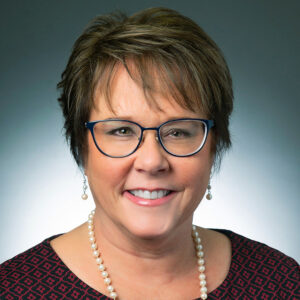
Vice president – supply chain services, Baptist Health
Please tell us about a key mentor or event in your life.
Cindy Gueltzow: I’ve been fortunate to work at Baptist Health for more than 20 years. During that time, I’ve had some wonderful mentors so it’s difficult to identify only one person who impacted my career. However, there have been two people who have been incredible mentors.
One of those individuals has been a constant in my career for 20 years. His role has grown over my time at Baptist Health and through his own evolution he significantly impacted my career. When I started at Baptist Health in 2000, I was quickly paired with Steve Oglesby in our finance department to develop a system supply chain that could positively impact expense reductions and revenue growth. Steve’s approach to developing a project starts with identifying how to successfully engage key stakeholders. Working with Steve over the years, I have learned that great leaders are good listeners in all circumstances. Additionally, they understand that inclusion is key to success and that kindness towards and caring for others is imperative. Because Steve, now our CFO, embodies these traits every day, I have the good fortune of seeing this in action so that I could develop those skills myself.
While I have not known Chief Operating Officer Patrick Falvey as long, his influence in my career has been remarkable. Focusing on long-term projects while managing daily operational improvements can feel daunting in a world filled with constant change. However, using data and team building, Patrick succeeds where others have not in our organization. By empowering and supporting his key team members, Patrick demonstrates how to drive success.
What did you learn about yourself and/or your supply chain team amid the COVID-19 pandemic?
Gueltzow: During the first few months of the COVID-19 pandemic, I was able to see the strength of my entire supply chain team from the materials management folks delivering products to the sourcing and contracting team that found the highest quality products available internationally. I’ve always known how dedicated my staff was to our health system, but the pandemic put the spotlight on my team so the entire health system could see the value we bring to the organization. We’ve sustained short-term recalls, backorders and supply chain disruptions in the past – however, we’ve never had to manage at this heightened level for an extended period of time until COVID-19. We’ve developed a deeper relationship with our infection control teams and our infection prevention physicians so that we can ensure we’re sourcing the very best products for our new needs. We’ve learned how to contract internationally. We’ve created product origin databases and forecasting analytics to improve our sourcing process. We created relationships with customs border officials, the CDC and the FDA, and we’ve secured an international logistics contract.
We learned that the international supply chain worked as designed, but it was not designed for a worldwide pandemic. Based on that fundamental fact, we learned that we must be willing to allow diversity in product selection in lieu of full standardization, be willing to increase domestic manufacturing in spite of cost increases, and we must decrease our dependence on a distributor as our only strategy for product fulfillment of commodity items. Last, but certainly not least, I learned that there is nothing that I and my team of supply chain professionals can’t accomplish on behalf of our organization!
